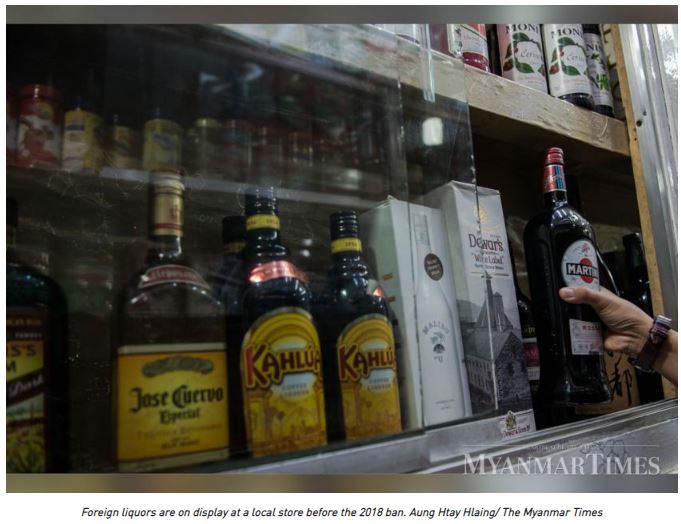Myanmar to ease decades-old alcohol import ban
Just months after the Yangon government strictly enforced a ban on stores selling foreign liquor, the Ministry of Commerce announced it would come up with draft legislation this year to relax the decades-old ban on alcohol imports.
Assistant secretary U Khin Maung Lwin told The Myanmar Times that the ministry is currently drafting a bill allowing the import of foreign spirits. After the bill is finalised based on inputs from different departments, it will be sent to the Attorney General’s Office for input.
The liberalisation is expected to pave the way for more direct foreign investment in the beverage industry and hit the thriving black market. The restriction on alcohol imports has resulted in massive quantities of foreign alcohol being smuggled into Myanmar, fuelling illicit trade.
Customs department data suggests that 1.3 million litres of distilled spirits valued at almost US$8 million was legally imported in 2017-18. The black market is estimated to be worth several hundred million dollars annually.
Thirty percent of all beer consumed in 2016 was illicit trade, according to research firm Euromonitor International. As a result, Nay Pyi Taw lost an estimated $50 million in tax revenue.
The commerce ministry was tasked with reviewing the policy after the National Economic Coordination Committee held a meeting at the President’s Office earlier this year. The ministry has formed a committee led by the deputy commerce minister that also includes senior officials from other ministries.
The committee will examine the import of foreign alcohol as well as the manufacture and distribution and excise rules.
He emphasised that it will only be a partial liberalisation of the market. The measure is intended to give reasonable room for foreign liquors to enter under some restrictions. The committee will finalise the bill within this year.
The review was made public after the establishment of the Myanmar Competition Commission, chaired by commerce minister U Than Myint. As reported earlier by The Myanmar Times, observers and business people say restrictions on the import of alcohol is among the key issues the Commission should investigate.
U Khin Maung Lwin denied that the change in import policy is related to the possibility of being investigated by the new competition body, saying the decision to review the policy was made under the U Thein Sein administration.
“Efforts to relax the import restrictions were initiated under the previous government. Many workshops have been held on this matter.”
Import of spirits have been tightly restricted in Myanmar since 1962. The current ban was introduced by the military government in 1995. Subsequently, the U Thein Sein administration permitted the import of wines in late 2015, but only hotels and duty-free outlets have been allowed to import spirits and beer.
U Aung Khant, who used to be involved in advocacy within the industry, said the relaxation is “a welcome change.”
“The protectionist regulations under the commerce ministry go against the government’s professed commitment to economic reform. Current restrictions on the import of alcohol have led to fake products, illicit trade and loss of tax. The policy only benefits local elites at the expense of everyone else – Myanmar consumers, businesses and the government’s coffer,” he commented.
EuroCham Myanmar, which lobbies for foreign spirits companies, received the news positively.
“We warmly welcome the ministry’s plans to liberalise spirits imports in Myanmar, as it will mitigate the large illicit spirits market, public health risks, and loss of government revenue,” said EuroCham deputy director Marc de la Fouchardiere.
In future, Myanmar authorities should look into tax reform to encourage legal imports and discourage illicit imports, while providing a sufficient level of protection to local producers, the director added. “But for this to happen, the first and key step is to allow legal imports to take place.”
The opening of the market will encourage more international players to invest in Myanmar and bring best practices on responsible consumption of alcohol to the country, he added. “Sound regulation should be proportionate, evidence-based, and not unduly burdensome on businesses, whilst promoting a socially responsible consumption culture for those who choose to drink.”
U Aung Khant emphasised that international companies and manufacturers need to push for responsible corporate practices in their Myanmar operations, including fair wages and capacity building for local employees.
The Myanmar Liquor Association, which represents local producers, declined to comment when contacted by phone.
Source: https://www.mmtimes.com/news/myanmar-ease-decades-old-alcohol-import-ban.html


 English
English




